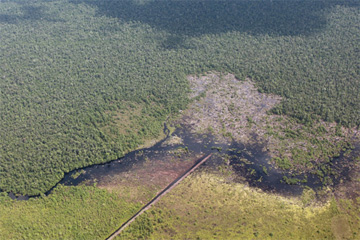The world’s largest user of palm oil, Unilever, has suspended its $32.6 million contract with the Indonesian group Sinar Mas after an independent audit proved that Sinar Mas is involved in the destruction of rainforest, reports Reuters.
The audit was conducted early this year after a report by Greenpeace alleged that Sinar Mas was engaged in deforestation and the draining of peatlands, both of which release significant amounts of greenhouse gases into the atmosphere. Deforestation across Indonesia and Malaysia, in part for oil palm plantations, has also added pressure on many many endangered species, including orangutans, tigers, elephants, and rhinos.
“The Greenpeace claims are of a nature that we can’t ignore. Unilever is committed to sustainable sourcing. Therefore, we have notified PT SMART that we have no choice but to suspend our future purchasing of palm oil,” said Unilever’s Chief Procurement Officer Marc Engel said in a statement according to Reuters.
 Draining and clearing of peat forest in Central Kalimantan. Photo by Rhett A. Butler. |
PT SMART is a subsidiary of Sinar Mas, which is the largest palm oil producer in Indonesia and the second largest in the world. Despite evidence of deforestation and peatland draining, Sinar Mas remains a member of the Roundtable on Sustainable Palm Oil (RSPO), a body which has created a standard for eco-certified palm oil.
Greenpeace’s report Burning Up Borneo, released in 2008, linked deforestation to Unilever’s suppliers through the use of maps, satellite data, and on-the-ground investigations.
“Unilever’s decision could represent a defining moment for the palm oil industry. What we’re seeing here is the world’s larger buyer of palm oil using its financial muscle to sanction suppliers who are destroying rain forests and clearing peatlands,” said Greenpeace director John Sauven in a statement. “This has set a new standard for others to follow. Companies that wish to be seen as environmentally responsible must immediately stop sourcing products from the Sinar Mas group.”
The independent audit by Unilever to verify Greenpeace’s claims was conducted by Eric Wakker of Aidenvironment, a not-for-profit consultancy firm. According to Aidenvironment’s report, the organization “verified the accuracy and validity of Greenpeace’s claims with regards to four of Unilvever’s palm oil supplier groups” adding that “Unilever’s supplier groups […] have indeed contributed to the opening up of (deep) peatland, deforestation of orangutan habitat and occurrences of fire hot spots”.
Unilever, an English-Dutch company, uses 1.3 million tons of palm oil every year in products ranging from soap to ice cream. Although it has been the object of Greenpeace protests in the past, Unilever has announced it will work with Greenpeace “to try to break the link between palm oil and deforestation,” adding that “together, we have set up a coalition of companies and organizations who will lobby for a moratorium on deforestation for palm oil.”
Unilever has said that it will only use palm oil from sustainable sources by 2015, however doubts raised about RSPO, including in the independent audit by Aidenvironment, may make Unilever’s pledge difficult.
Related articles
Unilever calls for ban on rainforest destruction for palm oil
(05/01/2008) Unilever, the world’s largest consumer good company, will start using palm oil from certified sustainable sources this year and aims to have all its palm oil certified by 2015, according to a speech delivered today by CEO Patrick Cescau.
Unilever admits it can’t trace origin of palm oil used in its products
(04/21/2008) Unilever has admitted to Greenpeace that it can’t trace the origin of palm oil supplied by firms operating in Indonesia. The relevation suggests that efforts to improve the sustainability of Indonesian palm oil have stalled as large tracts of rainforest continue to fall for the establishment of new oil palm plantations on the islands of Borneo, New Guinea, and Sumatra.
Biofuels can lead to deforestation says Unilever executive
(08/11/2006) While biofuels are hyped for their potential to off-set fossil fuel use, the shift toward their use should proceed with caution warns Alan Jope, vice president of consumer products giant Unilever. In an August 7 interview with The Times, Jope said that the environmental drawbacks of biofuels is overlooked.